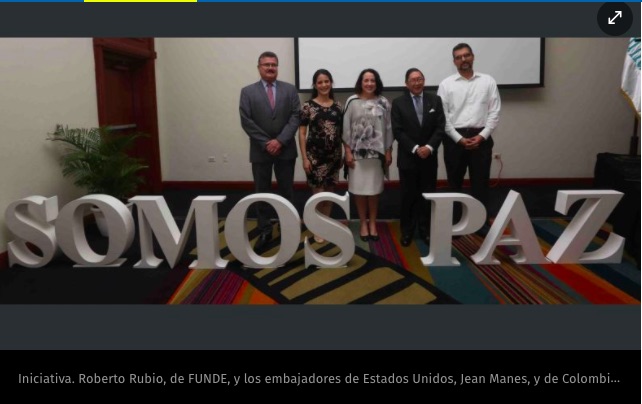.. DEMOCRATIC PARTICIPATION ..
An article from La Prensa Grafica (reprinted for non-commercial purposes)
Roberto Rubio, the executive director of the National Foundation for Development (FUNDE), launched the challenge: “We invite you to start changing the country. No more no less”. And that implies, he assured, to imagine “a country in peace.” That is the concept behind the citizen campaign “Préstale tu voz a SAL”, which FUNDE is carrying out with the support of the Seattle Foundation and in alliance with the Espacio Ciudadano network. They are joined by the embassies of the United States of America (USA) and Colombia.

“Small steps matter. The change on a large scale begins with individual commitment, “said the US diplomatic representative, Jean Manes, during the launch of the initiative, on Wednesday night.
(continued in right column)
(Click here for the Spanish original of this article)
How can culture of peace be developed at the municipal level?
(continued from left column)
On behalf of Colombia, Ambassador Julio Anibal Riaño said that the great example is the city of Medellín, which went from being the face suffered by narcoterrorism to a model of coexistence. “The greatest strength of Medellín is its people,” said the diplomat, referring to the “social re-engineering” that Mayor Federico Gutiérrez executed in the city. “Security,” said the mayor through a video that was transmitted during the launch of the citizen campaign, “is neither left nor right,” but a responsibility of all.
According to Rubio, “Préstale tu voz a SAL” is part of the “Somos Paz” movement, which seeks to promote the culture of peace in El Salvador through all daily activities. He explained that its purpose is to change impunity at all levels of society.
Manes noted that the city of Chattanooga in the United States went from being, in a span of 20 years, “the dirtiest city in America” to receiving recognition from the United Nations for having executed a total transformation. In addition, 10 years later, this model allowed the population of the American city to profit economically. It was only achieved, said Manes, when citizens, NGOs and businessmen got involved in a shared project.